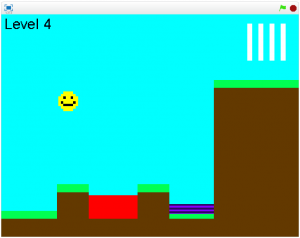At this week’s class our guest was Ricarose Roque from Lifelong Kindergarten, a Media Lab group that led the development of Scratch, a visual programing tool aimed at children and young people.
(A platform game called Marshall created in Scratch by WithOnions)
The Scratch Community has created more than 3 million projects since it began in 2003, and has spread to 150 countries, in 40 languages. It’s an incredible story of successful co-design built on a collaboration between educators, designers, engineers, parents and children. A key part of the Scratch practice is the family workshops the team run. Ricarose began by explaining three steps around which every workshop is built.
We start with a meal. “We eat. For parents who are really busy, this does double duty and it’s also a way to connect and relax.”
We Make. “We encourage parents and children to work together and take on different roles. Children are often unafraid, whereas parents are more hesitant.”
We Share. “It’s a chance to talk about what we’ve done and talk about process.”
While the workshop process is an exercise in codesign – parents and children often create games together – the design of Scratch itself is also an example of a long-term, multi-partner co-design process. Ricarose explained that the team worked with coordinators and community leaders to think about what the project’s goals are. She showed a whiteboard brainstorm about what participants understand as ‘signs of learning’ and ‘signs of teaching’, which was useful in making explicit what the community cares about and is aiming towards.
Ricarose said that the Scratch team’s collaborative process has changed a lot in the ten years the project has been active. Recently they implemented checkins for participants during and after workshops, an acknowledgement that the process of learning and development “doesn’t really end.”
You can read the liveblog of Ricarose’s conversation with the group here.
Later the group discussed an article by Josh Breitbart on the building of community mesh WiFi networks in Detroit. Sasha shared the Discotech Zines from the Detroit Digital Justice Coalition’s Discovering Technology group. The group focused on setting up intergenerational spaces where people could learn about technology regardless of their current skill and comfort level. DiscoTech is thinking broadly about what digital media literacies look like, not just coding, hardware, but across the intersections of culture and making and media. The Zines acted as reportbacks from the community focused events, including how-to guides on organizing DiscoTech events and lessons people learned in doing that work.
In the second half of the class, the four working groups reflected on the MOUs they submitted this week, and are now working towards the first draft of their project proposals. Look out for those on the site early next week!
